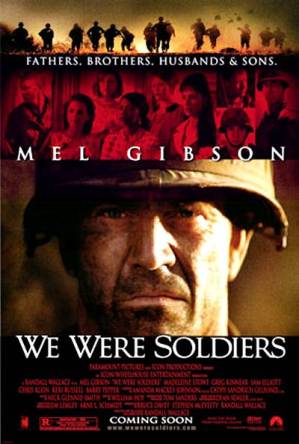
We Were Soldiers is an American motion picture, directed by Randall Wallace and release in 2002. It stars Mel Gibson as Lieutenant Colonel Hal Moore, Greg Kinnear as Major Bruce Crandall, Madeleine Stowe as Julia Moore, Sam Elliott as Sergeant Major Basil Plumley and Chris Klein as Lieutenant Jack Geoghegan.
We Were Soldiers is a dramatisation of the November 1965 Battle of Ia Drang, the first major battle between US forces and North Vietnamese Army (NVA) in the Vietnam War. It is based on Hal Moore’s 1992 book We Were Soldiers Once… and Young. Moore served in the US Army for 32 years, seeing service in Korea and Vietnam. He retired in 1977 at the rank of lieutenant general. He is depicted in the film by Mel Gibson.
Moore trains and bonds with the men of the 7th Cavalry who, after their training, are deployed to Vietnam. On arrival, Moore’s 400-man battalion is sent into the Ia Drang valley to eliminate communist soldiers there. Moore and his superiors are unaware that the valley houses a battle-hardened division of 4,000 NVA soldiers.
Much of We Were Soldiers focuses on the battle for Ia Drang, though the impact on soldiers’ wives back in the US is also shown. The film concludes with Moore and his surviving men withdrawing from the valley after completing their mission.
We Were Soldiers leads viewers through the rigours of battle by focusing on a small group of individuals, a common approach in war movies. It begins by teasing out their lives and personalities, then depicts their actions and experiences in combat.
Unlike films such as Platoon and Full Metal Jacket, We Were Soldiers avoids political judgements and is unashamedly sympathetic to the soldiers. This is true both of the Americans but also their enemy. The North Vietnamese are also depicted sympathetically, rather than as a faceless adversary or cannon fodder. The emotional strain of the war on wives and families is also well handled.
Though it avoids flag-waving patriotism, We Were Soldiers is largely a homage to war service and the brotherhood of soldiers who experience it.
Content on this page is © Alpha History 2018-23. Content created by Alpha History may not be copied, republished or redistributed without our express permission. For more information please refer to our Terms of Use.
